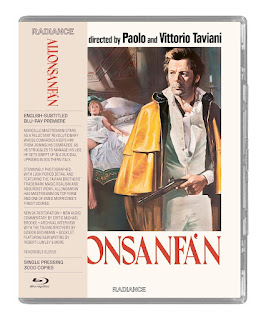Allonsanfàn
Not every movie should be an easy pill to swallow. Art, by its very nature, should challenge ones’ view of the world every once in a while. To quote Ingmar Bergman’s three commandments: “Thou shalt be entertaining at all times…thou shalt obey thy artistic consciousness at all times…and thou shalt make each film as if it is thy last.” And even if many of Bergman’s films were dismissed as self-indulgent, he always made an effort to meet the audience in the middle. As does Allonsanfàn (1974), Paolo and Vittorio Taviani’s artfully composed diatribe against personal and political hypocrisy in the modern world…set against the backdrop of Italian unification in 1861.
A dedicated member of the Sublime Brothers, a group of Italian revolutionaries, Fulvio (Marcello Mastroianni) is released from prison in the hope that he will lead authorities to his fellow freedom fighters. But Fulvio has soured on a life of personal sacrifice, instead leading his friends into a trap then making off with their accumulated wealth. Now reaccustomed to his social status, Fulvio’s dream of taking his son to American is thwarted by the reappearance of his ex-confederates who insist he join them in one last bid for ideological freedom.
Allonsanfàn bears a striking similarity to Kubrick’s Barry Lyndon released the following year, not just in terms of its historical setting but its focus on a character of questionable moral ethics. In Lyndon’s case, it’s a flaw inherent at birth. The Tavianai brothers paint a much more tragic portrait in the case of Fulvio, whose sudden loss of faith leads him to question if any emotion is worth defending: love, loyalty or even self-respect. His nihilistic world-view expands to fill the entire film, setting the stage for an often-complicated metaphor of social hierarchy and political activism.
Without some background on the Risorgimento, the 19th century social movement that culminated in the establishment of the Kingdom of Italy, it can be a challenge to keep up with movie’s opening 30 minutes. But the Taviani’s aren’t keeping score that closely either, bouncing from historical fact to contemporary fiction as it suits them, drifting into auteurist asides that are often more successful than the whole. The film’s use of music and color, particularly during an almost surreal storytelling sequence, are clever visual distractions in a movie that gives the audience no one to root for. Allonsanfàn - the title is both the name of a secondary character and a play on a French Revolution hymn - uses historical chaos and confusion to make its point about modern chaos and confusion…a technique that often outsmarts itself.
Radiance’s Blu-ray provides a new 2K restoration, new audio commentary by critic Michael Brooke and archival interview with Paolo Taviani to go along with a set of essential liner notes.




Comments
Post a Comment